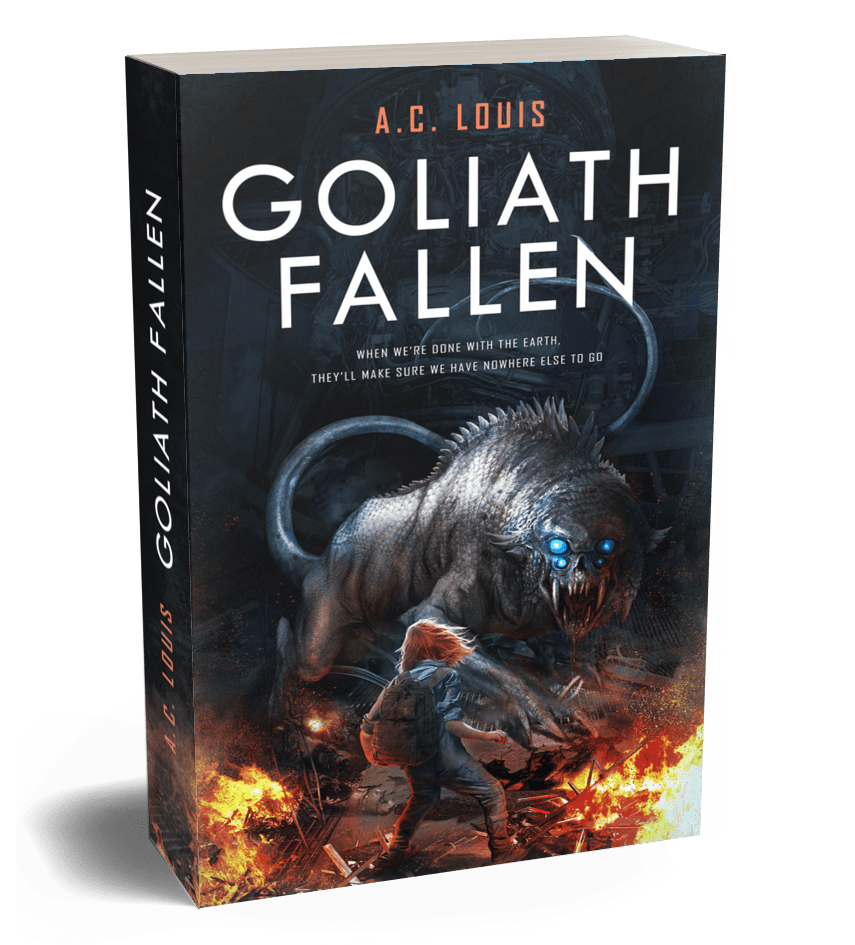I recently realized that my post about finding an editor for my novel, GOLIATH FALLEN, had skipped a crucial element of the journey: the fact that self-publishing on a budget helped me cut a third of my manuscript, which, unexpectedly, resulted in a better book.
Editors commonly charge by page or word count. As a result, total editing costs will depend on the length of the manuscript. With my book clocking in at a whopping 92,500 words, I’m facing editing costs of $2,700 at a modest $0.03 per word. However, my novel wasn’t always that length. It used to be a mind-boggling 150,000+ words. The newly reduced length was the result of a four-month rewrite campaign after realizing that hiring an editor would have cost me a kidney. The cheapest quote I received based on the original draft was $4,500. And if I wanted developmental editing, that would’ve run a whopping $9,000, which is triple my initial estimate and several months’ worth of rent where I live (Costa Rica.)
I was between a rock and a hard place, and the only way out was a painful one. After six years of writing and declaring my draft complete, I had no choice but to dive back in and “make it shorter.”

Finishing the book is only the beginning
“Make it shorter” sounds like a vague, unactionable thing a publisher would tell you after reviewing the phone book you just wrote. It leaves you with absolutely no clue where to start. It’s a frustrating realization to have after you finish writing your book. Realistically speaking, however, a debut novel of such dimensions also has an abysmal chance of getting published. I might also seem like I’m self-publishing because no agents would take my novel. I haven’t seriously queried this book yet, so I can’t say that’s the case.
Some fellow writers might relate to my plight here. I was forced to revisit the beloved manuscript I had been writing for years and trim not only a few sentences but cut entire scenes, reorganize or remove chapters, or even take out characters completely. They said self-publishing on a budget was hard, but this was simply soul-crushing.
Picture me sitting at my desk, hands on my head, looking down in despair, sweating from this dreadful realization, and trying to find a way out of this inescapable abyss. Dramatic? Yes. Accurate? Also yes. I had been writing for so long and was so excited to get this book out. But now, how long would it be before it’s truly ready?
Tough feedback is the best kind of feedback
One day, I shared this realization that my book needed trimming with one of my most trusted beta readers. As it turns out, she already had the same consideration, but it was hard for her to put it into concise, actionable feedback. One point she mentioned was my overuse of character reactions between dialogue. After some self-introspection, I realized I do this unconsciously because I write as if I was watching a movie. This beta reader hinted that I could easily remove all that fluff without altering the end product. I re-read the first chapters to confirm her realization and found plenty of passages like the following:
“Is… is that it?” Casper stuttered.
Viktor could almost hear the rusty cogs of his brain crunching, processing the situation. A sentence left his mouth by its own will: “Go. Wake up the others.”
That passage is way longer than it needs to be. It’s riddled with descriptions that don’t add enough to justify their existence. Instead, it could be easily rewritten to something like:
“Is—is that it?” Casper said.
Viktor froze, his mind racing. “Go. Wake up the others.”
This revised passage is cleaner, crisper, and about 20 words fewer. With a few simple changes, it’s easy to see how I could work my way through my manuscript to trim the edges without losing integrity.
Around the time my manuscript was available to beta readers, I also received critical feedback from my peers at the NYC Writers Critique Group. Specifically, one member said, “I’m 30,000 words in, and not a lot has happened”. I hadn’t understood what they meant initially, but they were right nonetheless. This realization was a big pill to swallow—a big pill of hard, cold truth.
And so, with this fresh perspective, I sailed off into a long, long journey. I started by reading my entire manuscript yet again. But this time, I read it not as a writer but as a reader. My fellow writers know how hard it is to swap your frame of reference like that. How do you detach from your creation in order to objectively read it like just another book? For me, it was a three-step process:
- Put the book away for a month.
- Re-read the entire book, but force myself not to edit a single word.
- Put the book away for another month.
The second step is the definition of torture. If I had read my book right from the word editor, I don’t think I could’ve resisted the temptation to edit it. With this in mind, I exported it as a PDF so that I couldn’t edit it but could add comments in bouts of weakness.
How self-publishing on a budget improved my manuscript
On that last read-through of my book, my fresh eyes didn’t only catch an exorbitant amount of fluff but they also discovered plenty of unnecessary descriptions, trivial dialogue, and scenes that needed to either be trimmed or cut out altogether. Not even two chapters in, I started getting “writer’s itch,” or that uncontrollable urge to get down to editing. I cursed that pesky, read-only PDF more times than I could count. But once I was done reading, I stuck to the plan and put my book away before a month’s long vacation in order to detox.
When the time came to get back to work, that last editing pass turned into a full rewrite as my hundreds of comments in the PDF had forecasted. It took three months to parse through the entire text, and by the end, my manuscript was an entirely different beast (and 58,000 words leaner). The pacing of the narrative benefited the most from this, resulting in better transitions between dialogue and action scenes. My proudest moment was pruning the introductory arc to four chapters instead of five, or 8,600 words instead of 18,000. It’s supposed to be an introductory arc, not a novella.
Final thoughts
After staring down the barrel of thousands of dollars in potential editing costs, I was forced to take a second look at my debut novel. Armed with critical feedback from readers and fellow writers, I embarked on a four-month-long journey deep into my characters, plotline, and chapters. Despite the initial despair and frustration, everything turned out well in the end. The fact that my limited budget helped me not only save on the costs of an editor, but I also was able to shave unnecessary fluff from beginning to end, resulting in an overall cleaner, streamlined novel. I couldn’t help but chuckle at the irony that self-publishing on a budget actually led me to write a better book.
If you’re a writer, I hope my perils made you feel a little less alone in the misery that can sometimes accompany editing your own self-published book. If you’re just a reader, well, perhaps you enjoyed a little bit of schadenfreude after reading my experience.
Please feel free to share your own self-editing experiences in the comments below. Have you ever had a realization in the late stages of editing that almost made you quit writing? How did you overcome it?
Get Two Books for Free

Get a preview of my sci-fi thriller, Goliath Fallen, by joining my exclusive mailing list for access to sales and giveaways. And don’t worry, I dislike spam as much as you do so don’t expect any from me. You can unsubscribe at any time.
